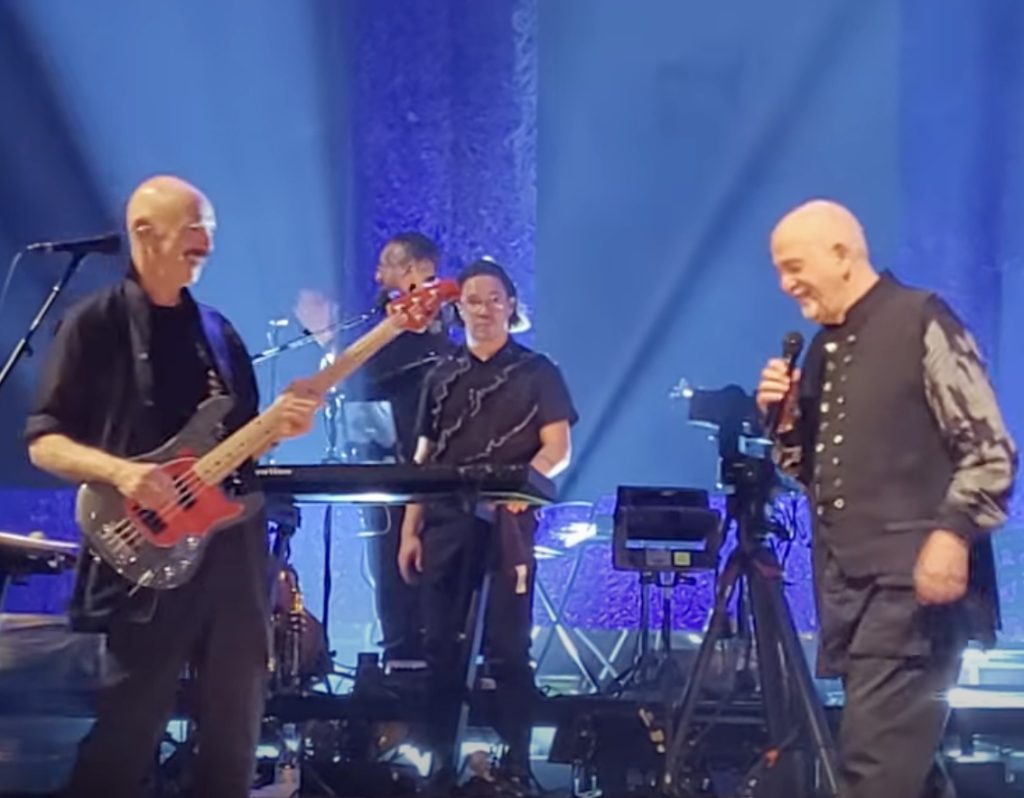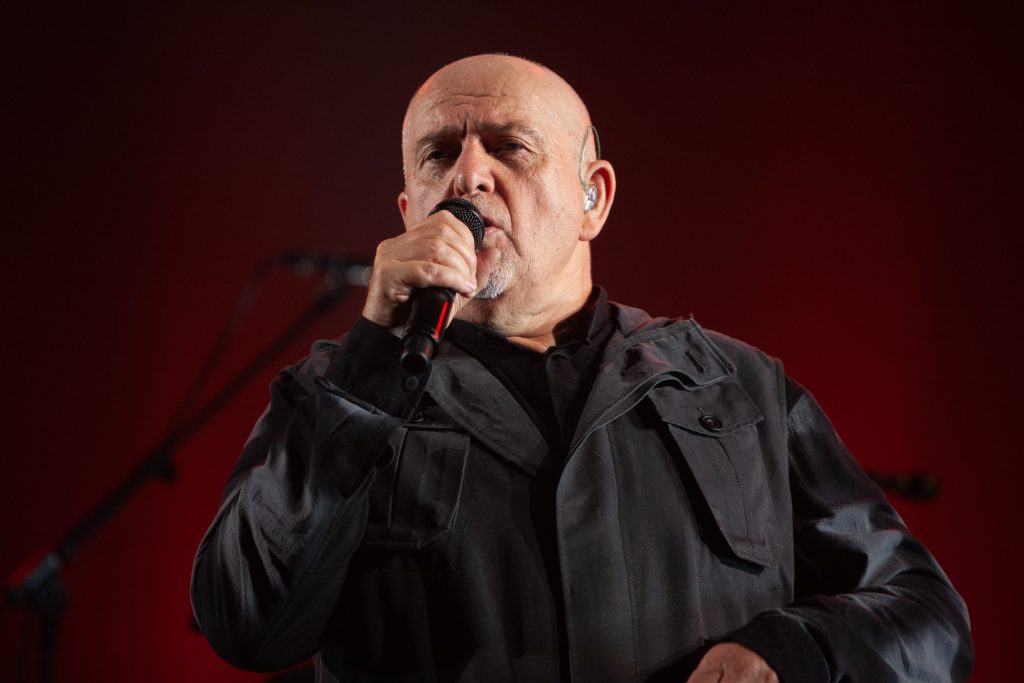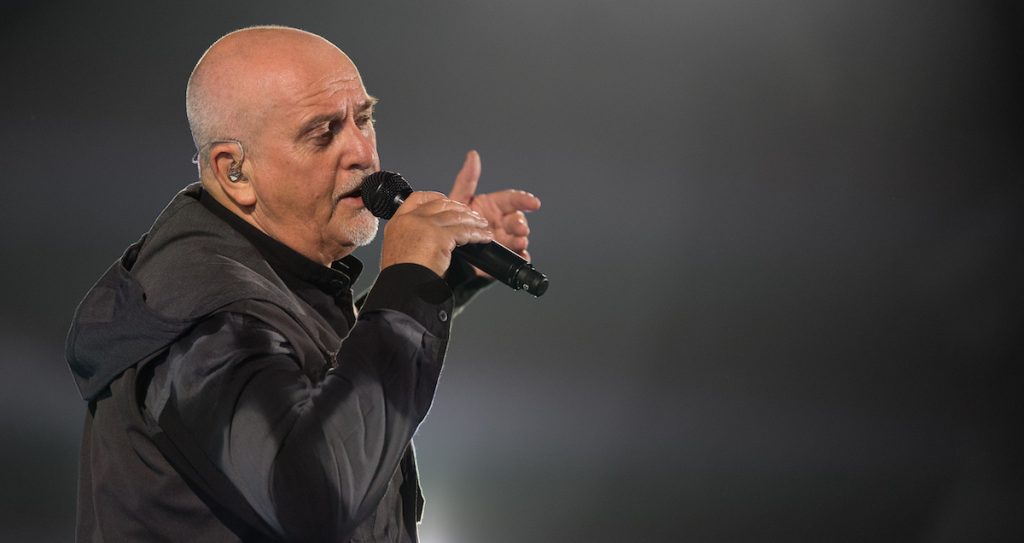
On the rise of each month’s full moon, since January of this year, Peter Gabriel has released a song from i/o, his first album of all new songs since 2002. On October 8, 2023, at the Client Pledge Arena, his Seattle-area fans were treated to live performances of 11 of those songs. Gabriel has always challenged his audience to explore his new music but 11 new songs is a lot to ask. Turns out that it wasn’t, however, as these tunes are woven into Gabriel’s rich catalog of work like a warm blanket.
Hanging over the stage is a giant clock with a silhouetted crew member erasing the big hand and immediately redrawing it one minute closer to showtime. At 8:00 p.m., Gabriel, wearing a flat cap and double-breasted brocade jacket, walks onto the stage alone. Referencing the clock, he talks of time being “the big boss” that “has us all in its claws.” He jokes to the audience that maybe they are seeing an avatar of himself that happens to be 20 years older and 20 kilograms heavier than the real Peter Gabriel, who is far away soaking up the sun on some exotic beach with the body of a Greek god. It’s a good laugh before he talks through the heavy themes that will be visited during the night’s performance: the hands of time and mortality, the universe and the origins of life on earth, human connectivity to everything living and dead, the existential threat and vaunted promise of artificial intelligence.
Gabriel segues softly from cosmic ideas to music as his long-time cully, bassist Tony Levin, joins him center stage to sit around the warm glow of a campfire. They kick off the night with an earthy version of “Washing of the Water.” The other band members join them, forming an intimate campfire circle as the song builds to a rousing unplugged crescendo. Sitting among this circle of talented musicians, Gabriel respectfully introduces each. There are the guys who have been by his side on tour and on albums for 40-plus years: Levin on bass, David Rhodes on guitars, Manu Katché on drums, and Richard Evans on guitar and flute. And there are the masterful newcomers: Ayanna Witter-Johnson (cello, piano, vocals), Marina Moore (violin, viola, vocals), Don E (keyboards) and Josh Shpak (trumpet, French horn, keys, vocals). The band launches into an intimate version of “Growing Up” from, Up, before moving from the campfire to the spacious three-tiered set that allowed the audience a good view of each of the nine musicians.

The first of the new songs, “Panopticon,” is preceded with a talk about the potential perils of Artificial Intelligence and the aspiration that, perhaps, the technology will be used in the best ways imaginable: advanced communication, universal education, worldwide healthcare for all, and a panoptic data stream that keeps an eye out for the evildoers. “Panopticon” is classic Peter Gabriel with a lilting melody and a buoyant chorus that showcases the driving power of veteran band members Levin, Rhodes and Katché.
Pulsing with a temperate trip-hop beat, “Four Kinds of Horses” is cinematic and dreamy, accentuated by Moore on violin in a duel with Shpak on trumpet. Another talk introduces the song, “I/O,” as Gabriel further explains his belief that everything, living and dead, shares a connection. I/O, he tells us, stands for Input/Output. It’s an easy-flowing and deeply personal song as Gabriel sings, “I’ll be laid to rest in a proper place, in the roots of an old oak tree, where life can move freely in and out of me.”
The new songs continue. “Playing for Time” is an instant classic with a sumptuous melody of piano and strings. The talks continue. Gabriel explains that “Olive Tree” is a song that alludes to mind reading and informs us of an up and coming MRI technology that translates brainwaves to video via an A/I algorithm. Gabriel’s story-telling is engaging and the concert begins to feel like a mash-up of Performance Art and a Ted Talk. Another new song, “This is Home,” is a warm and loving ode to family with a Motown-ish groove.
The finale of the first half is Gabriel’s biggest hit, “Sledgehammer.” In the wake of a set of adventurous new music and scientific revelations, it’s a jolt back to 1986, when Peter Gabriel was the biggest pop star on the planet. “Sledgehammer,” ironically, replaced “Invisible Touch” by Genesis, the band in which Gabriel established himself, as the #1 song on the Billboard Hot 100 and went on to win nine MTV Music Video Awards. That’s a record that still stands today. With the conspicuous first blast of the trumpet, the audience jumps to its feet as Gabriel dances across the stage, playfully leading the audience to sing along to every sexual double entendre.
Watch “Sledgehammer” from the Boston show in September 2023
The second half opens with the industrial grind of “Darkness.” It’s a jarring start as nothing in the first set was as aggro as this. Appearing from behind a scrim, a parade of shadowy images of Gabriel warns of a dark side: “I’m afraid I can be devil-man, and I’m scared to be divine, don’t mess with me, my fuse is short.” ˆThat mood changes quickly as Gabriel segues to “Love Can Heal,” a gorgeous soundscape of synths and strings that debuted in 2016 while Gabriel was on tour with Sting.
Gabriel shuffles back and forth across the stage singing “Road To Joy,” a song that recalls the funk rock rhythm of “Big Time,” courtesy of keyboardist Don E playing a Keytar and Levin on his emblematic Chapman Stick bass.
The magnificent cellist, pianist and singer Ayanna Witter-Johnson has her moment to shine on “Don’t Give Up.” As Gabriel sings of the despair of a fallen man, Witter-Johnson answers back with hope, love and empathy in the duet originally made famous by Kate Bush.
Three more new songs are introduced in the second set. “The Court” speaks to the abuses of the justice system as Gabriel’s impressionistic verses give way to a definitive refrain: “And the court will rise, while the pillars all fall.” Two songs that have yet to be released are “Live and Let Live,” a nod to the principles of Nelson Mandela set to a tune of celebration, and “And Still,” an ode to Gabriel’s mother.
Watch “Live and Let Live” as performed in Toronto
With a reference to climate change, Gabriel introduces “Red Rain,” quipping, “It seems every year the weather is getting stranger.” The fan favorite finds the band at the acme of perfection with layers of trumpet, cello, violin and keyboard fills accentuating the percussive heavy track. In an acknowledgement of his contribution, Gabriel credits Katché as the “explosive engine” of the band.
Pointing to the giant clock appearing again over the stage, Gabriel poses the question and answer, “Do you know what time it is?…it’s Big Time,” offering another opportunity to revisit the dance-rock that launched Gabriel into, well, the big time.
Watch Gabriel, live in Dublin in June 2023
Gabriel closes the show with “Solsbury Hill,” his first single after leaving Genesis and, arguably, the most defining song of his career. It is a glorious slice of pop perfection that stomps along to a 7/4 time signature and blushes with jangly guitars. As he skips joyfully across the stage, one wonders if Gabriel still gets the same heart-racing feeling that he had all those years ago when he sings about the revelation that letting go of Genesis was a risk that he had to take.
Watch “Solsbury Hill” from Madison Square Garden on the I/O tour
Before leaving the stage, Gabriel, born Feb. 13, 1950, re-introduces the band for the third, or maybe fourth, time. When they return for the encores he takes a minute to acknowledge the crew as cameras catch each of them at their posts for the audience to see. Throughout the night he has also acknowledged the individual visual artists who created the films that accompany each of the new songs. This is a man who truly appreciates and respects as equals all of the talent that surrounds him.
Related: Our Album Rewind of Gabriel’s So
The first encore is “In Your Eyes.” Having some fun, Gabriel holds the mic to Levin so he can sing “in your eyes” in a very deep basso. Katché kicks in with world beat percussion while Gabriel, Levin and Rhodes do a few simple dance steps that the entire band soon joins in on. The song comes to a pique when Witter-Johnson joins Gabriel at center stage to sing the parts originally recorded by Youssou N’Dour.
The band leaves the stage again but returns to answer the audience’s call for “Biko,” the anti-apartheid anthem that established Gabriel as a human rights activist and generated a monumental impact in the apartheid resistance movement. Telling the story of Steve Biko’s death in the manner of a news reporter, Gabriel quickly has the audience singing the chorus, “Biko, Biko, Because Biko, oh Biko,” and then leads them in a chant with protest fists lifted high. “What happens now is up to you,” he says, leaving the audience to finish the song while each band member follows Gabriel off-stage, one by one, until only Katché’s tom-tom beat remains. It is a solace ending to an enlightened evening of music, story-telling, visual art and the very welcome return of Peter Gabriel.
The i/o album and other Gabriel releases are available here.
Related: Listings for 100s of classic rock tours

